|
|
|
Sort Order |
|
|
|
Items / Page
|
|
|
|
|
|
|
| Srl | Item |
| 1 |
ID:
094722


|
|
|
|
|
| Publication |
2010.
|
| Summary/Abstract |
International norms and legal codes that are meant to protect human rights mean little for people in the developing world, who suffer abuse not for a lack of laws but because these laws are not enforced. It is imperative, therefore, that the human rights community build up political will and capacity among local law enforcement bodies.
|
|
|
|
|
|
|
|
|
|
|
|
|
|
|
|
| 2 |
ID:
143445
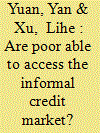

|
|
|
|
|
| Summary/Abstract |
The poor are often excluded from formal credit markets, but few empirical studies in literature have investigated whether the poor are constrained in the informal credit market. This paper uses recent micro data of rural China to answer this question. An instrumental variable model is estimated to account for potential endogeneity issues. Results show that poorer households have lower probability of entering the informal credit market. Further examination shows that the poor are limited by social network and that they have no financial means to invest in their social capital to expand their social network. Our findings shed light on potential solutions of reducing poverty in rural areas.
|
|
|
|
|
|
|
|
|
|
|
|
|
|
|
|
| 3 |
ID:
132460
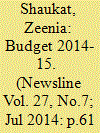

|
|
|
|
|
| Publication |
2014.
|
| Summary/Abstract |
This year's budget presented by the PML-N has been centred around economic growth.The question is whether this growth will be achieved at the expense of the masses.
|
|
|
|
|
|
|
|
|
|
|
|
|
|
|
|
| 4 |
ID:
086813


|
|
|
|
|
| Publication |
2009.
|
| Summary/Abstract |
Before the violence came, Margaret Atieno Okoth sold cabbage six days a week at a cramped stall in Nairobi's Toi market, alongside vendors selling everything from second-hand shoes to bicycle parts.
|
|
|
|
|
|
|
|
|
|
|
|
|
|
|
|
| 5 |
ID:
124982
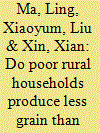

|
|
|
|
|
| Publication |
2013.
|
| Summary/Abstract |
China's poor rural households produce substantially less grain compared with non-poor rural households. The present paper applies a decomposition approach and uses China's rural household survey data to investigate the causes of this grain output gap. The paper first compares the grain output gap between poor and non-poor rural households, and then decomposes the gap into differences in yield and area sown. The results indicate that the gap in grain output mainly results from differences in the amount of inputs used in production. Differences in the number of labor days and the level of intermediate inputs account for 13.6 and 47.5 percent of the gap, respectively. Poor rural households are also less efficient in their use of intermediate inputs, which contributes to 13.2 percent of the gap. However, the efficiency of poor households' labor days reduces the gap by 7.2 percent, while agricultural physical capital, household head education and agricultural training have no substantial impact on the household grain output gap.
|
|
|
|
|
|
|
|
|
|
|
|
|
|
|
|
| 6 |
ID:
152332
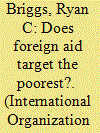

|
|
|
|
|
| Summary/Abstract |
To examine the extent to which foreign aid reaches people at different levels of wealth in Africa, I use household surveys to measure the subnational distribution of a country's population by wealth quintiles and match this information to data on the location of aid projects from two multilateral donors. Within countries, aid disproportionately flows to regions with more of the richest people. Aid does not favor regions with more of the poorest people. These findings violate the stated preferences of the multilateral donors under study, suggesting that the donors either cannot or are not willing to exercise control over the location of aid projects within countries. The results also suggest that aid is not being allocated effectively to alleviate extreme poverty.
|
|
|
|
|
|
|
|
|
|
|
|
|
|
|
|
| 7 |
ID:
123991
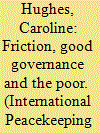

|
|
|
|
|
| Publication |
2013.
|
| Summary/Abstract |
Friction is a zone of contingency where creative responses of local and international agents produce unexpected effects. Viewing 'good governance' in this light allows better appreciation of the blurring of boundaries between international prescriptions and local cultures, often regarded as antithetical in the Cambodian case. In fact, actors in Cambodia mobilize both a newly invigorated domestic cultural discourse and international ways of working to pursue struggles over development in the post-conflict context. However, elite actors are much better placed to do this successfully than are the poor.
|
|
|
|
|
|
|
|
|
|
|
|
|
|
|
|
| 8 |
ID:
145715
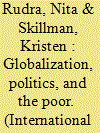

|
|
|
| 9 |
ID:
106090
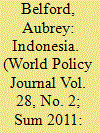

|
|
|
| 10 |
ID:
151582
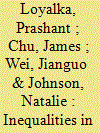

|
|
|
|
|
| Summary/Abstract |
Inequalities in college access are a major concern for policymakers in both developed and developing countries. Policymakers in China have largely tried to address these inequalities by helping disadvantaged students successfully transition from high school to college. However, they have paid less attention to the possibility that inequalities in college access may also arise earlier in the pathway to college. The purpose of this paper is to understand where inequalities emerge along the pathway to college in China, focusing on three major milestones after junior high. By analysing administrative data on over 300,000 students from one region of China, we find that the largest inequalities in college access emerge at the first post-compulsory milestone along the pathway to college: when students transition from junior high to high school. In particular, only 60 per cent of students from poor counties take the high school entrance exam (compared to nearly 100 per cent of students from non-poor counties). Furthermore, students from poor counties are about one and a half times less likely to attend academic high school and elite academic high school than students from non-poor counties.
|
|
|
|
|
|
|
|
|
|
|
|
|
|
|
|
| 11 |
ID:
142690
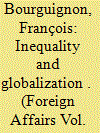

|
|
|
|
|
| Summary/Abstract |
When it comes to wealth and income, people tend to compare themselves to the people they see around them rather than to those who live on the other side of the world. The average Frenchman, for example, probably does not care how many Chinese exceed his own standard of living, but that Frenchman surely would pay attention if he started lagging behind his fellow citizens. Yet when thinking about inequality, it also makes sense to approach the world as a single community . accounting, for example, not only for the differences in living standards within France but also for those between rich French people and poor Chinese (and poor French and rich Chinese).
|
|
|
|
|
|
|
|
|
|
|
|
|
|
|
|
| 12 |
ID:
099453
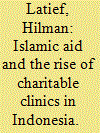

|
|
|
|
|
| Publication |
2010.
|
| Summary/Abstract |
By exploring Islamic charitable clinics in Indonesia, this paper shows how community-based initiatives and zakat [Islamic charitable obligation] agencies have provided wider access to viable health services for destitute families in poor urban and rural areas. Zakat agencies, with their charitable clinics, have recently gained strong support from both society and the government. They have, for example, tried to bring a community response to the current social economic challenges through the revitalization of the zakat and Islamic charity practice. Low-priced, accessible and free medical assistance for poorer families and small economic enterprises provided by the zakat agencies reflect the endeavours of middle class Indonesian Muslims to translate Islamic discourse on social welfare in a more concrete way. The rise of Islamic charitable clinics, whose origins and motives can partly be linked to the Islamic discourse of the welfare of the ummah [the Islamic community], is without doubt a consequence of emerging interpretations of the meaning and function of Islamic aid in contemporary Indonesian Islam.
|
|
|
|
|
|
|
|
|
|
|
|
|
|
|
|
| 13 |
ID:
150657
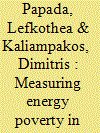

|
|
|
|
|
| Summary/Abstract |
A comprehensive research in the field of energy poverty is undertaken in this paper, in an attempt to highlight the great vulnerability of Greek households on energy poverty, in the middle of a severe economic crisis. Till now, Greek energy policy has been considered insufficient to tackle energy poverty issues, as focusing mainly on short-term rather than permanent solutions. A primary survey has been conducted, recording objective data of energy expenses as well as subjective perceptions about housing conditions. The findings showed that, under the objective expenditure-based method, 58% of Greek households are energy poor. Among households under the poverty threshold, the energy poverty rate exceeds 90%. Existing and new subjective indicators shed light on other aspects of energy poverty, such as the level of thermal comfort at home, damp problems detected, restriction of other essential needs in order to manage energy payments, etc. Some interesting conclusions are also drawn by exploring the relationship between various indicators. It appears that households considered energy poor are not identical when examined by objective and subjective indicators. However, different indicators complement each other by capturing different aspects of the problem and provide a broader overview of the issue.
|
|
|
|
|
|
|
|
|
|
|
|
|
|
|
|
| 14 |
ID:
105154
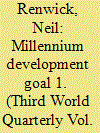

|
|
|
|
|
| Publication |
2011.
|
| Summary/Abstract |
This article considers three questions: 1) what progress has been made in achieving MDG1 targets?; 2) what challenges remain?; and 3) what more could and should be done? To examine these questions, the article assesses the progress of Southeast Asia in seeking to achieve MDG1. It argues that the region is 'on track' to achieve MDG 1 targets, although significant challenges such as inequality remain. Economic growth, significant structural change and incorporation into global value chains have contributed to MDG progress. However, this is a double-edged sword as exposure to global economic turbulence can increase. The longer-term reduction of poverty, inequality and social exclusion is a question of empowerment of local producers within value chains-a shift in economic power and control through pro-poor strategies strong enough to effect substantive structural change. The article outlines key concepts; identifies the main characteristics of Southeast Asian poverty; outlines what more needs to be done; and concludes by reprising the article's findings and weighing the prospects for 2010-15 and beyond.
|
|
|
|
|
|
|
|
|
|
|
|
|
|
|
|
| 15 |
ID:
120602
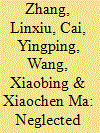

|
|
|
|
|
| Publication |
2013.
|
| Summary/Abstract |
Despite increasing institutional and financial support, certain public health issues are still neglected by the Chinese Government. The present paper examines the soil-transmitted helminth (STH) infection and reinfection rates by conducting a survey on 1724 children in Guizhou Province, China. Our results indicate that 37.5 percent of children had been infected with one or more of the three types of tested STH. However, only 50.4 percent of children reported having taken deworming medicine during the 18-month period before the survey. Of those who reported being dewormed, 34.6 percent tested positive for STH infections. Poverty and number of siblings are significantly and positively correlated with infection and reinfection, and parental education is significantly and negatively correlated with infection and reinfection. Given the ineffectiveness of treatment in these areas to date, for anthelminthic campaigns to actually succeed, China must pay more attention to local-level incentives to improve children's health.
|
|
|
|
|
|
|
|
|
|
|
|
|
|
|
|
| 16 |
ID:
105155
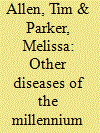

|
|
|
|
|
| Publication |
2011.
|
| Summary/Abstract |
The sixth MDG aims 'to combat HIV/AIDS, TB, malaria and other diseases'. The residual category of 'other diseases' has become the focus of intense interest, partly because it has provided an opportunity to increase resources for the control of the mostly parasitic 'neglected tropical diseases' (NTDs). Intense lobbying has secured large amounts of funding from donors, as well as generous donations of medicines from the major drug companies. A massive programme is now underway to treat the parasites of the poor in Africa via integrated vertical interventions of mass drug administration in endemic areas. The approach has been hailed as remarkably effective, with claims that there is now a real prospect of complete control and, for some NTDs, even elimination. However, a closer look at evaluation and research data reveals that much less is known about what is being achieved than is suggested. Competition between implementing organisations is leading to potentially counterproductive exaggerations about treatment coverage. Detailed local-level research in Uganda and Tanzania shows that actual rates of drug take-up among target populations are often lower than is necessary to effectively control the diseases, and that methods of drug distribution may even lead to active resistance to treatment. If current trends are not corrected, declining rates of NTD infection will not be sustained. Much more rigorous and effective monitoring is essential.
|
|
|
|
|
|
|
|
|
|
|
|
|
|
|
|
| 17 |
ID:
024596
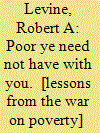

|
|
|
|
|
| Publication |
Cambrige, MIT Press, 1970.
|
| Description |
vii, 261p.
|
|
|
|
|
|
|
|
|
|
|
|
Copies: C:1/I:0,R:0,Q:0
Circulation
| Accession# | Call# | Current Location | Status | Policy | Location |
| 004579 | 362.5/LEV 004579 | Main | On Shelf | General | |
|
|
|
|
| 18 |
ID:
096353
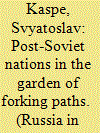

|
|
|
| 19 |
ID:
045603


|
|
|
|
|
| Publication |
London, Tavistoch Publications, 1972.
|
| Description |
xvii, 389p.
|
| Series |
Studies in social ecology and pathology
|
|
|
|
|
|
|
|
|
|
|
|
Copies: C:1/I:0,R:0,Q:0
Circulation
| Accession# | Call# | Current Location | Status | Policy | Location |
| 009565 | 361.05/PIV 009565 | Main | On Shelf | General | |
|
|
|
|
| 20 |
ID:
100539
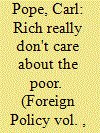

|
|
|
|
|
|
|
|